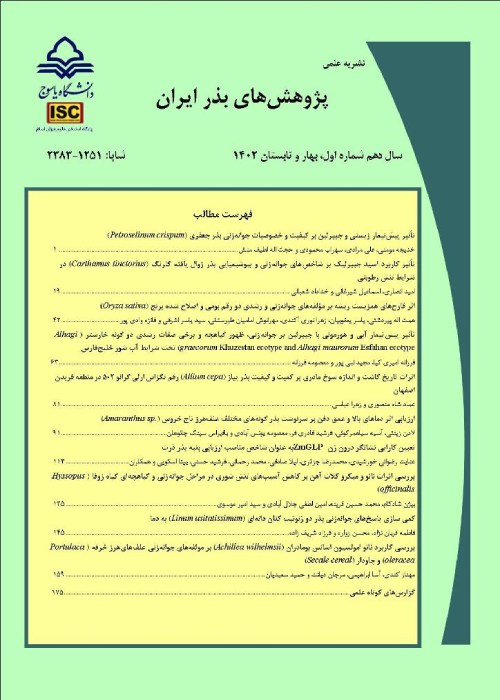Investigating the effects of nano and micro iron chelate to alleviate salinity stress damages at hyssop (Hyssopus officinalis) germination and seedling stages
Salinity stress is one of the important damaging factors for seed germination which interrupts the uptake of some nutrients by lowering soil water potential and causing ion toxicity due to salt accumulation inside the seeds. Since hyssop seeds are sensitive to salinity stress in the early stages of seed germination, it is necessary to investigate seed enhancement methods to improve seed germination in this species under saline conditions. In this research, the effects of seed priming using iron were studied on hyssop seed germination characteristics under salinity stress conditions.
This research was conducted as two separate factorial experiments in complete random design with three replications. The treatments included five levels of iron nano-chelate and micro-chelate (zero, 50, 100, 200, and 400 mg /l) and six levels of salinity (zero, 50, 100, 150, 200, and 250 mM) and two priming durations. It included 12 and 24-hours.
The results showed that with the increase in salinity, the germination characteristics declined so at 200 mM of salinity, seedling growth declined significantly and ceased completely at 250 mM level. Application of iron micro-chelate under non-stress conditions did not have any positive effect on hyssop germination, and the use of distilled water for 12 hours worked better than iron nano-chelate. No significant difference was observed among the different concentrations in micro-iron treatment. Application of nano and micro chelate at 100 and 150 mM salinity stress had a stronger effect so that nano iron chelate concentrations of 200 mg/L for 12 hours and 100 and 200 mg per liter concentrations of iron micro chelate had the highest germination, seedling growth, and seed germination in 24 hours. The amount of soluble protein and peroxidase and catalase activity increased at 50 mg/L salinity but decreased at higher salinities. Also, pretreatment of seeds with an iron micro-chelate and nano iron chelate concentration of 200 mg/liter intensified this process.
The results of this study showed that seed germination of hyssop is highly declined due to salinity stress, so the seedlings were unable to grow at a salinity concentration of 200 mg/L. Moreover, germination does not occur at 250 mg/liter salinity. Also, seed pretreatment of this plant is not justifiable under non-stress and mild stress conditions, and pretreatment with iron chelate had negative effects and was ineffective at best. However, iron chelate application at high salinity levels- especially in the nanoscale with a concentration of 200 mg/liter for 12 hours- is effective in reducing the effect of salinity.
Highlights:
1- The role of the iron element was investigated by seed pretreatment method to alleviate the negative effects of salinity stress on hyssop seed germination characteristics.
2- The nanotechnology used in the production of iron fertilizer and its effect on improving the germination characteristics of hyssop under salinity stress were investigated.
- حق عضویت دریافتی صرف حمایت از نشریات عضو و نگهداری، تکمیل و توسعه مگیران میشود.
- پرداخت حق اشتراک و دانلود مقالات اجازه بازنشر آن در سایر رسانههای چاپی و دیجیتال را به کاربر نمیدهد.



